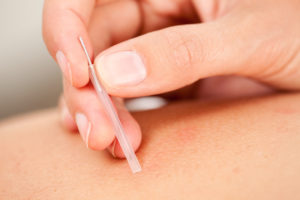Worldwide Anxiety and Depression are recognized as major public health problems that substantially impact on both, the individual and the wider society. Every year, more and more people suffer from mental health disorders like Anxiety and Depression (which are the most common mental health issues). In fact, over 15.7 million people in the United States suffer from anxiety annually and 121 million people suffer from depression globally. They can be chronic causing considerable distress and disability. This vast prevalence has created a dire need for viable solutions. Often, people with these conditions seek complementary treatments like acupuncture.
Acupuncture is a widely known and highly-reputed form of alternative medicine. It is an integral part of ancient Chinese medicine that involves the use of thin needles to pierce the skin at strategic points. Interestingly, the actual practice of acupuncture varies across cultures and locations as techniques tend to change quickly depending on the country in which it is done. According to research, acupuncture can relieve pain and has been shown to alleviate chronic pain in people suffering from conditions like neck pain knee pain. Low-back pain, osteoporosis and other inflammation-based pain conditions. However, due to a lack of scientific backing, the clinical guidelines that exist are highly inconsistent in its general recommendation. One of the reasons why it has gained so much traction on a global scale is its complementary nature as it can be used alongside other treatment options and is relatively safe when done properly.
How acupuncture benefits depression and anxiety
Research has shown that acupuncture can be helpful in treating depression and anxiety. While the evidence of this is low due to the bias that comes from the difficulty in setting up effective experiments, results have shown that this practice can reduce the severity of depression.
Experts believe that acupuncture can help relieve anxiety and provide coping systems for depression as it creates an enabling atmosphere for endorphin production. The insertion of needles stimulates the production of endorphins which in turns creates a burst of the “feel good” chemicals into the bloodstream. With anxiety, acupuncture helps to regulate and calm the production of neurochemicals e.g. levels of inflammatory cytokines associated which are created when the brain is stressed, this, in turn, soothes the brain and helps the body manage its Heart Rate Variability. Acupuncture also “turns off” the analytical brain which is known to reduce sensitivity to pain but also stress, which is responsible for anxiety.
One large review research consisting of 64 studies and 7104 participants inferred that acupuncture results were better when compared to no treatment, being put on a waiting list, or treatment as usual. According to a study published in the Journal of Alternative and Complementary Medicine, Electro-acupuncture, where a mild electrical current is passed through the needles, proved to be as effective as traditional anti-depressant fluoxetine (Prozac), and may even be effective in treating the side effects that come with the use of medication. Another, more recent review study also supported its clinical efficacy in patients with chronic pain and depression. Therefore as a safe treatment, acupuncture could be considered in patients who are having a poor response to conventional pain killers or having unwanted side effects.
References:
- Smith CA, Armour M, Lee MS, Wang LQ, Hay PJ. Acupuncture for depression. Cochrane Database Syst Rev. 2018;3(3):CD004046. Published 2018 Mar 4. doi:10.1002/14651858.CD004046.pub4
- Rodriguez T, Stern V. Can acupuncture treat depression?. Scientific American. July 2014.
- Yan B, Zhu S, Wang Y, Da G, Tian G. Effect of acupuncture on chronic pain with depression: A systematic review. Evid Based Complement Alternat Med. 2020. 1741-427X. https://doi.org/10.1155/2020/7479459
